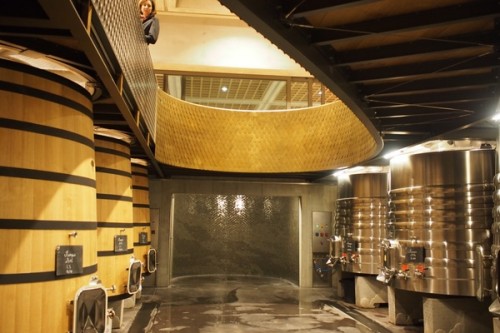
Last week I was in Bordeaux with a small group, and as well as tasting through most of the top 2017s, we visited a couple of prestigious Châteaux, and got a very brief look at the 2018 vintage. It was a lovely experience, and we really felt like we were being granted privileged access.
This week is primeur week, and increasingly the leading Châteaux aren’t taking part in the main tastings. Instead, they expect people to come to them to taste. It used to be just the first growths who did this, but now there’s a whole slew of Châteaux with big ambitions who see themselves as part of the elite group. The invited guests will get special treatment, and given that the top places will be seeing around 1500 visitors over the week, each Château will get through around two barrels of the Grand Vin.
All this hosting is a considerable expense, but to the Châteaux it is worth it. The point is that by granting top trade and press privileged access, it changes the social dynamic of the interaction. I’ve been inside a few Bordeaux Châteaux over the last few years, and pretty much all of the top places have renovated their cellars since they started making serious money a couple of decades ago. They are spotless, with state of the art equipment, and the barrel cellars resemble cathedrals more than working wineries. These are places of worship.
For aspirational Bordeaux Châteaux, where external money has flowed in and they are now trying to climb the social ranking, the expensive renovation and hyper-functional winery is an important display: it says ‘we are now part of the club, and you must take our wines seriously – things have changed.’
It is very hard as a visiting journalist or trade buyer not to be at least subliminally influenced by the grandeur of the top properties, and to feel grateful for the chance – at least for a short while – to feel part of this world. It takes a strong conscious effort to evaluate the wines fairly.
It’s not just in Bordeaux that privileged access is used as a tool to try to influence the gatekeepers and opinion leaders. The wine calendar is full of single-producer new release tastings. All the top Grand Marque Champagne houses expect you to come to their event to taste. Often they will tempt you with access to the chef du cave (this can be useful for interviews), a vertical tasting (this is always handy) or, at worst, a fancy lunch or dinner. In the new world, top producers such as Penfolds do a new release tasting on their own, rather than participate in larger events.
This privileged access is nice if you get it, but the problem with it is the unspoken threat: it can be rescinded. You are meant to feel lucky. You are in the club. What happens if you break club rules? You are out of the club.
It is a brave person who scores a first growth in the low 90s, or suggests that the wines are too polished, or picks the wine too late. Only a foolhardy Australian journalist would score Grange lower than 97 points, or for an international journalist, lower than 95.
What do consumers think? I suspect they are tired of the lack of transparency, and the endless positive reviews for the established leaders in each field. I applaud those critic publications who refuse to rate in situ and insist on tasting blind, but then true impartiality is only of use if the critics are good at what they do and have good taste. Not all tick these boxes.
For me, most of my work is with less exalted producers. The privileged access there is the ability to visit them, talk and walk their vineyards, and taste together. Most of these people value honestly held opinions, though. They are happy when they get good ratings, but they tend to value transparency and honesty, and writers who make an attempt to understand what they are up to. This is a much happier place to be.
5 Comments on Privileged access


Great piece, Jamie. Lots of good points, especially the bit about it being difficult to score famous properties accurately.
I’m also more interested in less exalted producers. Wines that people actually drink.
I’m glad that top Bordeaux wines exist but in terms of value many are not high achievers. I understand that the much-maligned-but-still-frequently-used 100 point scale isn’t linear. But even so, is a 96 point wine worth 20 x a 90 point wine? Might a slightly edgy 92 pointer from say Jura sometimes be more fun to drink than a 94 point 3rd growth? Does Bordeaux today justify all media attention?
You state that there is a risk of subliminal influence if you are invited to taste at a top chateau. I’m sure that’s true.
But there is no subliminal influence if you visit other wine makers? Who you may taste and socialise with – plenty of pictures of you doing that on here – and who may pay your expenses?
This doesn’t make sense to me.
Richard – why do your comments always obsess about who’s picking up the tab?
There is always subliminal influence. It’s a question of degree. I’m merely commenting here on the social contract that can be created when there is an invitation into another world, with the attendant risk that this can be rescinded.
I think since around 2000 the top chateaux have just become the crazy design label of the wine world. Recognisable names for dim witted members of the super rich to remember when trying to spend their vast wealth. Once a wine starts costing more than a months wages of the poor bugger who picked the grapes I think it is time to look for other regions, or for the scores of Cru B makers out there.